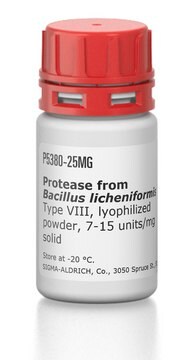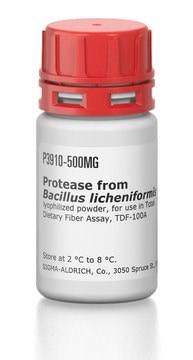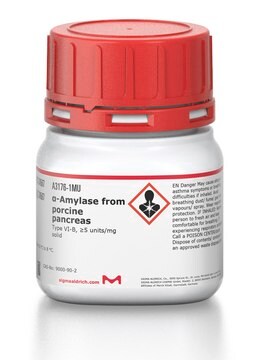P7545
Pancreatin from porcine pancreas
8 × USP specifications
Synonym(s):
Pancreatin from hog pancreas
Sign Into View Organizational & Contract Pricing
All Photos(3)
About This Item
Recommended Products
form
powder
Quality Level
specific activity
8 × USP specifications
contains
lactose as extender
storage temp.
−20°C
Looking for similar products? Visit Product Comparison Guide
Application
Pancreatin is a mixture of several digestive enzymes produced by the exocrine cells of the porcine pancreas. It is a broad-spectrum protease composed of amylase, trypsin, lipase, ribonuclease and protease. It is used for in vitro digestibility analysis. Product P7545 has been used to test the sensitivities of cellulolytic bacteria inhibitors.
The enzyme has been used along with amyloglucosidase for the in vitro digestion of starch in food samples. Pancreatin from Sigma has been used for in vitro pepsin-pancreatin digestion assays while estimating of lower gut digestibility using rumen feed residues. It has also been used along with pepsin to simulate in vitro gastric and ileal digestion of raw materials in pigs.
Biochem/physiol Actions
Due to the enzymatic components such as trypsin, amylase and lipase, pancreatin hydrolyzes proteins, starch and fats. Pancreatin will convert not less than 25 times its weight of potato starch into soluble carbohydrates in 5 minutes in water at 40 °C, will digest not less than 25 times its weight of casein in 60 minutes at pH7.5 at 40 °C and will release not less than 2 microequivalents of acid per min per mg pancreatin from olive oil at pH9.0 at 37 °C.
Pancreatin contains enzymatic components including trypsin, amylase and lipase, ribonuclease, and protease, produced by the exocrine cells of the porcine pancreas. This combination of enzymes allows it to hydrolyze proteins, starch and fats. Pancreatin will convert not less than 25 times its weight of potato starch into soluble carbohydrates in 5 minutes in water at 40°C, will digest not less than 25 times its weight of casein in 60 minutes at pH 7.5 at 40°C and will release not less than microequivalents of acid per min per mg pancreatin from olive oil at pH 9.0 at 37°C.
Signal Word
Danger
Hazard Statements
Precautionary Statements
Hazard Classifications
Eye Irrit. 2 - Resp. Sens. 1 - Skin Irrit. 2 - Skin Sens. 1 - STOT SE 3
Target Organs
Respiratory system
Storage Class Code
11 - Combustible Solids
WGK
WGK 1
Choose from one of the most recent versions:
Already Own This Product?
Find documentation for the products that you have recently purchased in the Document Library.
Customers Also Viewed
Carbon balances for in vitro digestion and fermentation of potential roughages for pregnant sows.
Becker, P. M., et al.
Anim. Feed Sci. Technol., 110(1), 159-174 (2003)
Yan Li et al.
Food chemistry, 221, 1151-1157 (2016-12-17)
Homologous and heterologous cross-linked polymers of whey protein isolate (WPI), soy protein isolate (SPI) and casein (CN) and their binary mixtures, viz., WPI+SPI, WPI+CN and SPI+CN, were produced using transglutaminase, and their in vitro IgE reactivity and digestibility under simulated
John A Monro et al.
The British journal of nutrition, 103(2), 295-305 (2009-11-26)
Glycaemic responses to foods reflect the balance between glucose loading into, and its clearance from, the blood. Current in vitro methods for glycaemic analysis do not take into account the key role of glucose disposal. The present study aimed to
Estimation of ruminal degradation and intestinal digestion of tropical protein resources using the nylon bag technique and the three-step in vitro procedure in dairy cattle on rice straw diets.
Promkot, C., M. Wanapat, and P. Rowlinson
Asian-Australasian Journal of Animal Sciences, 20(12), 1849-1849 (2007)
J Chen et al.
Microbiology (Reading, England), 147(Pt 1), 21-30 (2001-02-13)
Competition among three species of ruminal cellulolytic bacteria - Fibrobacter succinogenes S85, Ruminococcus flavefaciens FD-1 and Ruminococcus albus 7 - was studied in the presence or absence of the non-cellulolytic ruminal bacteria Selenomonas ruminantium or Streptococcus bovis. Co-cultures were grown
Our team of scientists has experience in all areas of research including Life Science, Material Science, Chemical Synthesis, Chromatography, Analytical and many others.
Contact Technical Service












